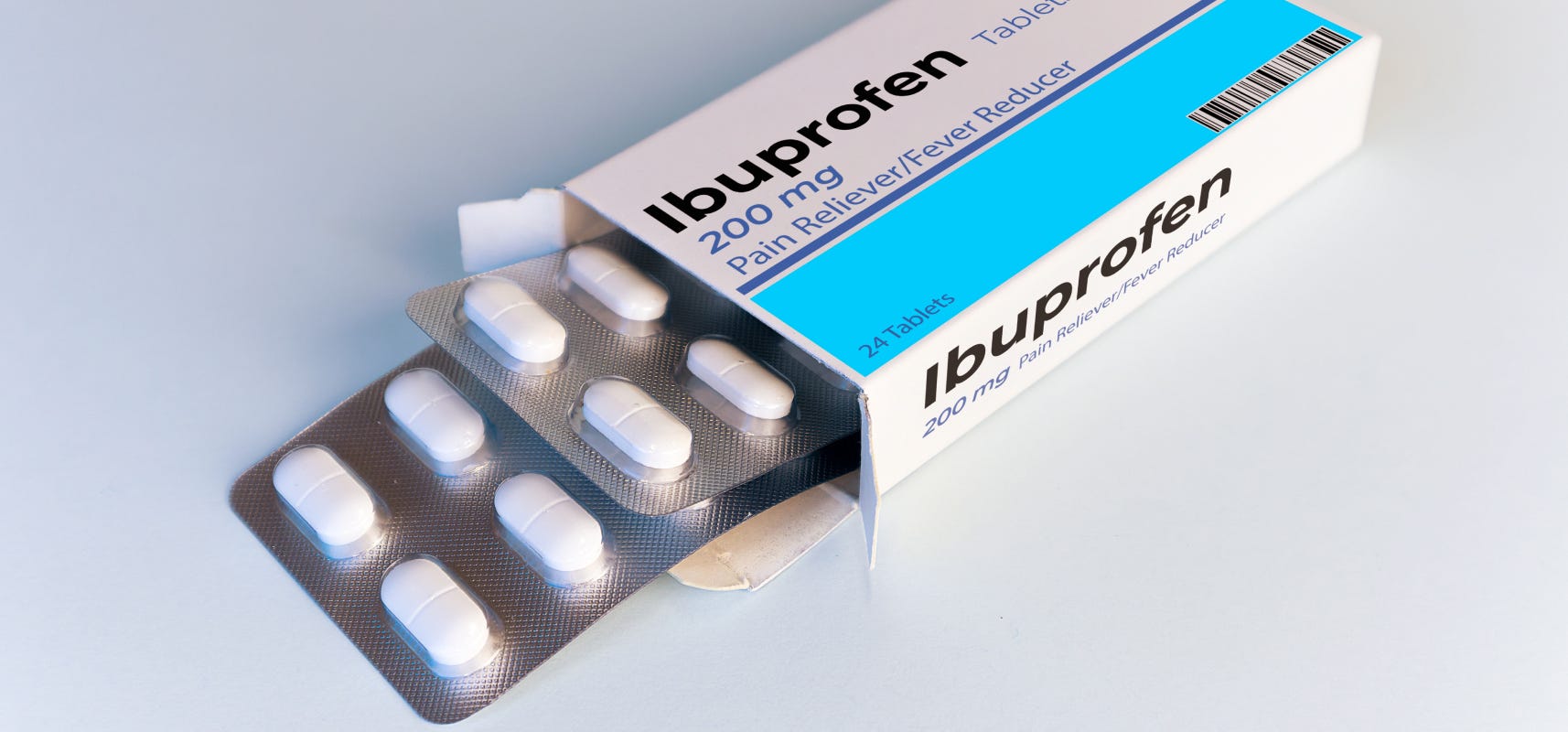If you're experiencing postpartum pain or discomfort, or cold symptoms, you might be wondering, "Can I take ibuprofen while breastfeeding?" and you're not alone! Many new moms worry about how over-the-counter (OTC) cold medicines and pain relievers might affect their breastfeeding baby or even their breast milk and milk supply. The good news is that among OTC cold medications, ibuprofen is generally considered one of the safest pain relievers to use while breastfeeding; however, you should always speak with your healthcare provider before starting or stopping any medications while breastfeeding.
Let's dive into what you need to know about using ibuprofen and other cold medicines during your breastfeeding journey, including safety considerations, dosage guidelines, and best practices for managing discomfort.
Understanding Ibuprofen and Breastfeeding Safety
Ibuprofen is a nonsteroidal anti-inflammatory drug (NSAID). It’s the generic word for name brands you might be familiar with, like Advil and Motrin, and it is a common OTC cold medication known to reduce swelling, fever, aches, and pains.
Ibuprofen is generally considered safe during breastfeeding because it has unique properties that make it particularly compatible with breastfeeding. Ibuprofen has a short half-life, meaning it breaks down quickly in your body rather than building up over time.
When you take ibuprofen, very little of the medication passes into your breast milk, and it is not known to impact breast milk supply. Some research has found that a fully breastfed infant would ingest about 0.2% of a pediatric dosage of ibuprofen through breast milk. And according to the results of some studies—such as one where breastfeeding women were given 400mg twice a day while another breastfeeding group was given 400mg every 6 hours—ibuprofen was undetectable in breast milk.
While it is still important to consult with your healthcare provider before taking any medication, ibuprofen is often a preferred choice for treating various types of pain and inflammation while breastfeeding, from postpartum discomfort to headaches and muscle strain.
Best Practices for Taking Ibuprofen While Nursing


To ensure the safest possible use of ibuprofen during breastfeeding, it's important to follow some key guidelines. Always take the minimum effective dose needed to manage your pain. Standard over-the-counter ibuprofen doses (typically 400mg every 4-6 hours, not exceeding 1200mg per day) are generally considered safe while breastfeeding.
Some mamas prefer to take breastfeeding-safe medications (including ibuprofen) around their baby’s feeding schedule. For instance, you might consider taking ibuprofen right after feeding or right before your baby's longest sleep period. This allows the medication to reach its peak levels in your system when your baby is least likely to be breastfeeding. Additionally, you may want to avoid extended-release formulations, as regular, short-acting ibuprofen gives you better control over the timing and dosage.
As always, it is best to discuss your ideal dosage and preferred timing with your healthcare provider.
When to Be Extra Cautious
While ibuprofen is generally safe for breastfeeding mothers and shouldn’t have an impact on milk production, certain situations call for extra consideration. If you're feeding a premature baby or an infant with any kidney problems, consult with your healthcare provider before taking any medication, including ibuprofen. The same applies if you have a history of stomach ulcers, asthma, or other medical conditions that might be affected by ibuprofen use.
Do Not Take Ibuprofen While Pregnant
It's also important to note that just because ibuprofen is safe to take during breastfeeding doesn't mean it's safe during pregnancy. In fact, taking NSAIDs like ibuprofen while pregnant is generally not recommended, especially after the 20-week mark.
Remember that safety considerations are often quite different for pregnant women than for those who are not, so always verify with your healthcare provider about medication use during pregnancy.
Alternative Pain Management Strategies


While ibuprofen can be helpful, some mamas might prefer non-medicinal approaches to pain relief, particularly during the postpartum period. Sometimes simple measures like applying cold or warm compresses, gentle stretching, or practicing relaxation techniques can complement or sometimes replace the need for medication, depending on your level of pain and comfort.
For mamas seeking a good, reliable compress, we recommend trying a solution like these Lansinoh TheraPearl 3-in-1 Therapy Packs. They’re shaped to comfortably conform to the breast and can be used hot or cold!
And for breast-related discomfort specifically, proper positioning during feeding and ensuring a good latch can help to reduce some common sources of pain. That said, if you're experiencing persistent breast pain, working with a certified lactation consultant can be invaluable in identifying and addressing the root cause.
Aeroflow Breastpumps is proud to offer access to lactation consultants and online classes to support breastfeeding mothers! Click here to fill out our simple form and see if you qualify through insurance.
Of course, do not hesitate to reach out to your healthcare provider to discuss, evaluate, and treat any pain or discomfort you may be experiencing.
Managing Cold and Flu Symptoms While Breastfeeding
While ibuprofen can help with fever and body aches, many breastfeeding mothers wonder about treating their complete cold and flu symptoms while breastfeeding. Let's look at what's generally considered safe and what to avoid.
Can You Get a Flu Shot While Breastfeeding?
Yes, you can get a flu shot while breastfeeding. Except for rare cases, the flu vaccination is considered safe for breastfeeding women in most cases (and infants older than 6 months) and should not impact milk supply. In fact, nursing parents who receive the flu vaccine while breastfeeding develop antibodies that are shared with babies through breast milk.
Safe Cold and Flu Treatments While Breastfeeding


If you're dealing with a cold or flu while breastfeeding, you might be reaching for that ibuprofen to help with your fever and body aches. But what about all those other uncomfortable symptoms? Runny nose, sore throat, coughing—being sick while taking care of a baby is tough enough without worrying about whether your medications are safe for your little one.
The good news is that there are several safe options for managing cold and flu symptoms while breastfeeding, and many of them you might already have at home. While you should consult with your healthcare provider for personalized advice, these treatments are generally considered safe for breastfeeding mothers:
-
Like ibuprofen, acetaminophen (Tylenol) is considered generally safe for fever and pain relief
-
Saline nasal sprays and rinses to relieve congestion
-
Fluticasone nasal spray for congestion
-
Running a humidifier to ease congestion
-
Salt water gargles for sore throat
-
Plenty of rest and hydration
Natural Remedies for Nursing Mothers
Of course, some mamas prefer to start with natural remedies when fighting a cold or flu. If this sounds like you, consider options like:
-
Steam inhalation with a bowl of hot water and towel over your head
-
Elevated sleeping position to help with congestion
-
Chicken soup or vegetable soup for hydration
-
Vitamin C-rich foods like citrus fruits and berries
And, as mentioned earlier, salt water gargles and running a humidifier might also provide some cold symptom relief.
For other medications, such as those not available OTC, be sure to discuss each one with your healthcare provider.
Impact on Breast Milk Supply
Many mothers worry about how illness and medications might affect their milk supply. While some decongestant pills (like pseudoephedrine, commonly known as Sudafed) can temporarily decrease milk supply and are typically not advised for breastfeeding mothers, most cold and flu treatments like those we’ve discussed in this blog won't affect it significantly. To maintain your supply while sick:
-
Continue breastfeeding or pumping on your regular schedule
-
Stay well-hydrated
-
Rest as much as possible
-
Remember that continuing to breastfeed helps protect your baby by passing on antibodies
Tips for Protecting Your Baby
While treating your symptoms, you can help prevent passing illness to your baby:
-
Wash hands frequently, especially before breastfeeding or handling pump parts
-
Consider wearing a mask while nursing if you're coughing
-
Continue breastfeeding, as your milk contains antibodies that help protect your baby
-
Clean and sanitize pump parts thoroughly after each use
-
Have a healthy partner or family member help with baby care when possible to limit exposure
When to Contact Your Healthcare Provider
While ibuprofen is safe for most breastfeeding mothers, it's important to reach out to your healthcare provider if you find yourself needing pain relief frequently or if your pain isn't responding to standard OTC doses. This could indicate an underlying issue that needs attention. Additionally, if you notice any unusual symptoms in yourself or your baby, don't hesitate to seek medical advice.
Your healthcare provider can help you develop a comprehensive pain management plan that takes into account your specific situation and needs while ensuring the safety of your breastfeeding baby.
Remember, mama, taking care of yourself is an important part of taking care of your baby. With proper precautions and guidance, you can safely manage pain while continuing your breastfeeding journey. If you have any questions about breast pumps or other breastfeeding supplies, give Aeroflow Breastpumps a call today at 844-867-9890 or contact us via chat or email. We're here to help!









